BBC蓝色星球纪录片英文观后感
蓝色星球第二季观后感英文150字初中水平
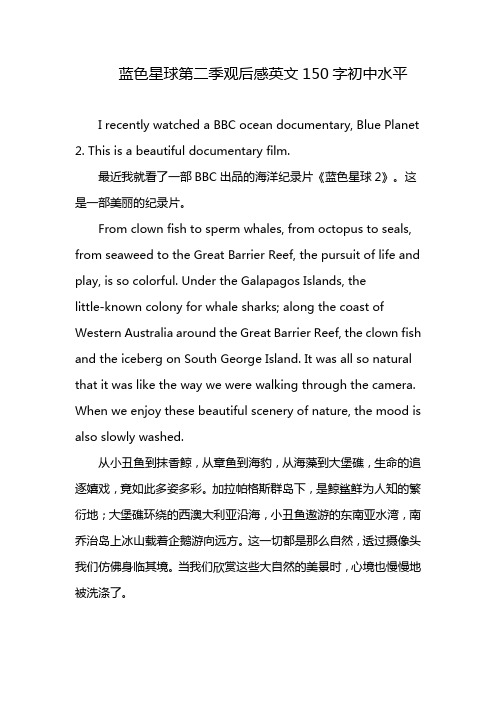
蓝色星球第二季观后感英文150字初中水平I recently watched a BBC ocean documentary, Blue Planet2. This is a beautiful documentary film.最近我就看了一部BBC出品的海洋纪录片《蓝色星球2》。
这是一部美丽的纪录片。
From clown fish to sperm whales, from octopus to seals, from seaweed to the Great Barrier Reef, the pursuit of life and play, is so colorful. Under the Galapagos Islands, thelittle-known colony for whale sharks; along the coast of Western Australia around the Great Barrier Reef, the clown fish and the iceberg on South George Island. It was all so natural that it was like the way we were walking through the camera. When we enjoy these beautiful scenery of nature, the mood is also slowly washed.从小丑鱼到抹香鲸,从章鱼到海豹,从海藻到大堡礁,生命的追逐嬉戏,竟如此多姿多彩。
加拉帕格斯群岛下,是鲸鲨鲜为人知的繁衍地;大堡礁环绕的西澳大利亚沿海,小丑鱼遨游的东南亚水湾,南乔治岛上冰山载着企鹅游向远方。
这一切都是那么自然,透过摄像头我们仿佛身临其境。
当我们欣赏这些大自然的美景时,心境也慢慢地被洗涤了。
A good documentary will inevitably bring a visual impact and bring more profound education to people. The documentary is able to use close-up shots and bloody facts to tell people how much damage your actions do to nature. we should cherish it.好的纪录片必然能够在带来视觉冲击的同时给人们带来更深远的教育。
《蓝色星球》观后感六百字作文
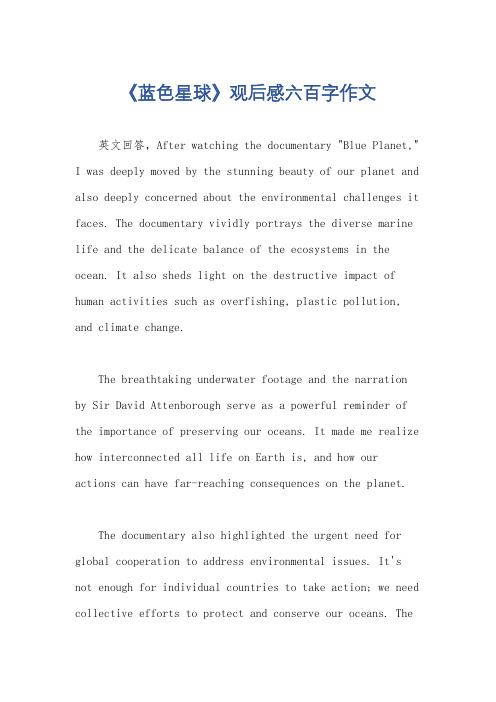
《蓝色星球》观后感六百字作文英文回答,After watching the documentary "Blue Planet,"I was deeply moved by the stunning beauty of our planet and also deeply concerned about the environmental challenges it faces. The documentary vividly portrays the diverse marine life and the delicate balance of the ecosystems in the ocean. It also sheds light on the destructive impact of human activities such as overfishing, plastic pollution, and climate change.The breathtaking underwater footage and the narration by Sir David Attenborough serve as a powerful reminder of the importance of preserving our oceans. It made me realize how interconnected all life on Earth is, and how our actions can have far-reaching consequences on the planet.The documentary also highlighted the urgent need for global cooperation to address environmental issues. It's not enough for individual countries to take action; we need collective efforts to protect and conserve our oceans. Thefilm inspired me to think about what I can do in my ownlife to reduce my environmental footprint and advocate for sustainable practices.Overall, "Blue Planet" is a visually stunning and thought-provoking documentary that has left a lasting impression on me. It's a wake-up call for all of us to take responsibility for the well-being of our planet and work towards a more sustainable future.中文回答,观看完《蓝色星球》这部纪录片后,我对地球的惊人美丽深感震撼,同时也对其面临的环境挑战深感担忧。
蓝色星球英语观后感
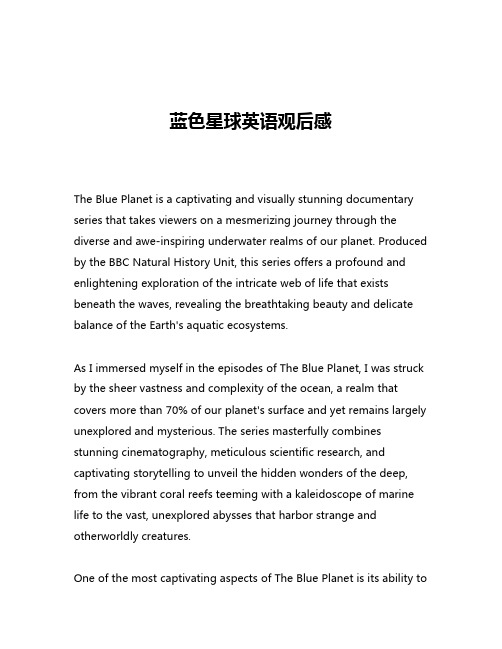
蓝色星球英语观后感The Blue Planet is a captivating and visually stunning documentary series that takes viewers on a mesmerizing journey through the diverse and awe-inspiring underwater realms of our planet. Produced by the BBC Natural History Unit, this series offers a profound and enlightening exploration of the intricate web of life that exists beneath the waves, revealing the breathtaking beauty and delicate balance of the Earth's aquatic ecosystems.As I immersed myself in the episodes of The Blue Planet, I was struck by the sheer vastness and complexity of the ocean, a realm that covers more than 70% of our planet's surface and yet remains largely unexplored and mysterious. The series masterfully combines stunning cinematography, meticulous scientific research, and captivating storytelling to unveil the hidden wonders of the deep, from the vibrant coral reefs teeming with a kaleidoscope of marine life to the vast, unexplored abysses that harbor strange and otherworldly creatures.One of the most captivating aspects of The Blue Planet is its ability totransport the viewer to these underwater realms, allowing us to witness the intricate behaviors and adaptations of the diverse inhabitants of the ocean. The series showcases the incredible diversity of marine life, from the graceful and majestic whales to the mesmerizing and bizarre invertebrates that dwell in the depths. Each episode delves into the unique challenges and strategies employed by these aquatic denizens as they navigate the ever-changing and often harsh environments of the ocean.The cinematography in The Blue Planet is simply breathtaking, with the filmmakers employing cutting-edge technology and techniques to capture the underwater world in stunning detail. The series utilizes innovative camera angles, slow-motion footage, and innovative lighting techniques to reveal the hidden beauty and complexity of the ocean, from the vibrant coral reefs to the eerie and otherworldly deep-sea environments. The attention to detail and the ability to capture the subtle nuances of marine life are truly remarkable, leaving the viewer with a deeper appreciation and understanding of the ocean's wonders.Beyond the visual splendor, The Blue Planet also delves into the critical importance of the ocean's ecosystems and the delicate balance that sustains life on our planet. The series explores the interconnectedness of the various marine habitats, highlighting the crucial role that the ocean plays in regulating the Earth's climate,providing essential resources, and supporting the livelihoods of countless human communities around the world. The series also shines a light on the pressing environmental challenges facing the ocean, such as overfishing, pollution, and the impacts of climate change, underscoring the urgent need for conservation and sustainable management of our marine resources.One of the most powerful aspects of The Blue Planet is its ability to inspire a sense of wonder and awe in the viewer, encouraging us to appreciate the incredible diversity and fragility of the ocean's ecosystems. The series reminds us that the ocean is not just a vast, empty expanse, but a living, breathing entity teeming with life and interconnected in ways that we are only beginning to understand. By immersing us in the captivating stories of the ocean's inhabitants, The Blue Planet invites us to consider our own place within the larger web of life and to reflect on our responsibility to protect and preserve this vital and irreplaceable resource.In conclusion, The Blue Planet is a truly remarkable and transformative documentary series that has the power to inspire, educate, and captivate audiences around the world. Through its stunning visuals, meticulous scientific exploration, and compelling storytelling, the series invites us to dive beneath the surface and discover the hidden wonders of the ocean, fostering a deeper appreciation and understanding of the delicate balance that sustainslife on our precious blue planet. As we face the urgent challenges of environmental degradation and climate change, The Blue Planet serves as a powerful reminder of the fragility and importance of our aquatic ecosystems, and the vital role that we all have to play in protecting and preserving this invaluable natural treasure.。
蓝色星球第一季观后感800字
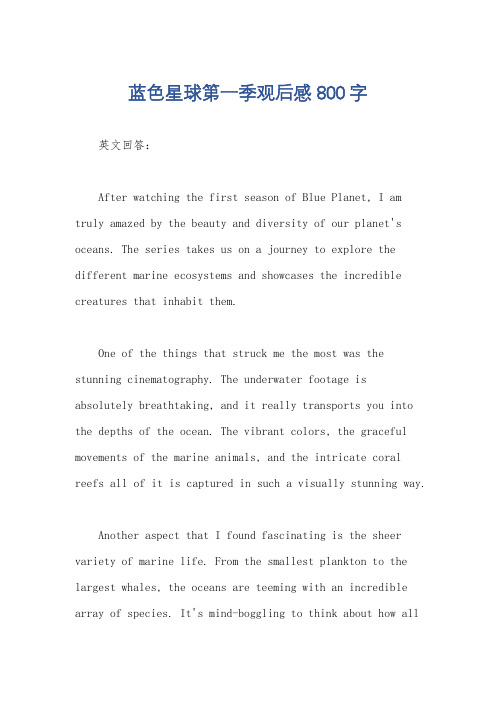
蓝色星球第一季观后感800字英文回答:After watching the first season of Blue Planet, I am truly amazed by the beauty and diversity of our planet's oceans. The series takes us on a journey to explore the different marine ecosystems and showcases the incredible creatures that inhabit them.One of the things that struck me the most was the stunning cinematography. The underwater footage isabsolutely breathtaking, and it really transports you into the depths of the ocean. The vibrant colors, the graceful movements of the marine animals, and the intricate coral reefs all of it is captured in such a visually stunning way.Another aspect that I found fascinating is the sheer variety of marine life. From the smallest plankton to the largest whales, the oceans are teeming with an incredible array of species. It's mind-boggling to think about how allthese different organisms coexist and interact with each other in such a complex ecosystem.The series also sheds light on the challenges that our oceans are facing, such as pollution, overfishing, and climate change. It serves as a wake-up call for us to take better care of our planet and its oceans. Seeing the devastating impact that human activities can have on marine life really hit home for me.Overall, Blue Planet is not just a visually stunning documentary, but also a thought-provoking one. It reminds us of the importance of preserving our oceans and the incredible biodiversity they hold. It's a must-watch for anyone who wants to appreciate the beauty of our planet and understand the urgent need for conservation.中文回答:看完《蓝色星球》第一季后,我对地球的海洋之美和多样性感到非常惊叹。
蓝色星球第一季观后感500字
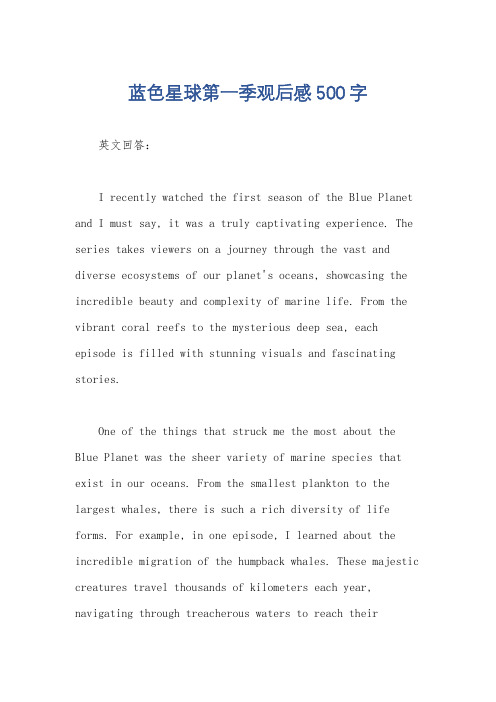
蓝色星球第一季观后感500字英文回答:I recently watched the first season of the Blue Planet and I must say, it was a truly captivating experience. The series takes viewers on a journey through the vast and diverse ecosystems of our planet's oceans, showcasing the incredible beauty and complexity of marine life. From the vibrant coral reefs to the mysterious deep sea, each episode is filled with stunning visuals and fascinating stories.One of the things that struck me the most about the Blue Planet was the sheer variety of marine species that exist in our oceans. From the smallest plankton to the largest whales, there is such a rich diversity of life forms. For example, in one episode, I learned about the incredible migration of the humpback whales. These majestic creatures travel thousands of kilometers each year, navigating through treacherous waters to reach theirbreeding grounds. It was truly awe-inspiring to witness such determination and resilience in the animal kingdom.Another aspect of the series that I found particularly intriguing was the exploration of the deep sea. The Blue Planet delves into the darkest depths of the ocean, where sunlight cannot penetrate and the pressure is crushing. Despite these extreme conditions, there are still organisms that have adapted and thrived in this harsh environment. For instance, I was fascinated by the deep-sea anglerfish, which uses a bioluminescent lure to attract prey in the pitch-black abyss. It is these kinds of adaptations and survival strategies that make the Blue Planet socaptivating to watch.Furthermore, the Blue Planet also sheds light on the impact of human activities on our oceans. It highlights the devastating effects of pollution, overfishing, and climate change on marine ecosystems. For example, in one episode, I learned about the alarming decline of coral reefs due to rising ocean temperatures. It was a stark reminder of the urgent need to protect and preserve our oceans for futuregenerations.中文回答:我最近观看了《蓝色星球》第一季,我必须说,这是一次非常吸引人的体验。
蓝色星球第一季观后感
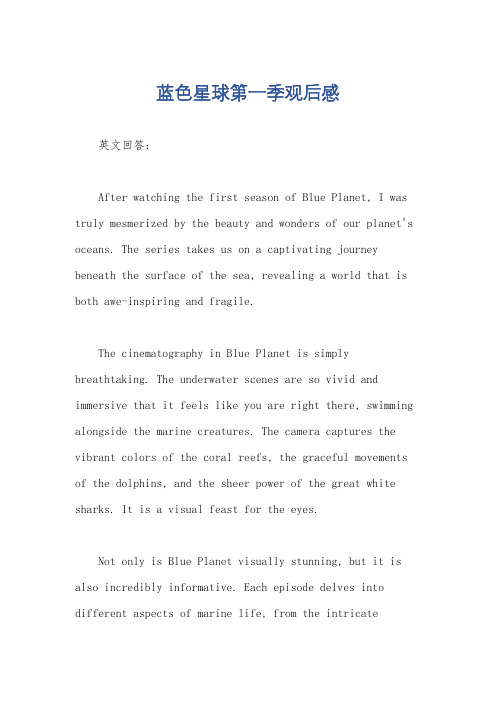
蓝色星球第一季观后感英文回答:After watching the first season of Blue Planet, I was truly mesmerized by the beauty and wonders of our planet's oceans. The series takes us on a captivating journey beneath the surface of the sea, revealing a world that is both awe-inspiring and fragile.The cinematography in Blue Planet is simply breathtaking. The underwater scenes are so vivid and immersive that it feels like you are right there, swimming alongside the marine creatures. The camera captures the vibrant colors of the coral reefs, the graceful movements of the dolphins, and the sheer power of the great white sharks. It is a visual feast for the eyes.Not only is Blue Planet visually stunning, but it is also incredibly informative. Each episode delves into different aspects of marine life, from the intricateecosystems of the coral reefs to the mysterious deep sea. The narration by Sir David Attenborough is both educational and engaging, providing fascinating insights into the behaviors and adaptations of the various species.One of the most memorable moments for me was in the episode about the open ocean. The camera followed a group of hunting sailfish as they worked together to corral a school of sardines. It was a thrilling chase, with the sailfish using their incredible speed and agility to catch their prey. This scene perfectly captured the raw power and beauty of the natural world.Blue Planet also highlights the urgent need for conservation. It exposes the devastating impact of human activities on marine life, such as overfishing and pollution. Seeing the heartbreaking images of plastic waste floating in the ocean and the coral reefs bleached byrising temperatures was a stark reminder of the responsibility we have to protect our planet.中文回答:观看了《蓝色星球》第一季后,我对地球的海洋之美和奇迹感到深深的着迷。
蓝色星球二观后感500字
蓝色星球二观后感500字【中英文实用版】Title: Response to "Blue Planet II"Title: 对《蓝色星球二》的观后感I have recently watched "Blue Planet II", a documentary series that takes an intimate look at the lives of marine creatures.It is asequel to the groundbreaking original series, and it does not disappoint.我最近观看了《蓝色星球二》,这是一部记录海洋生物生活的纪录片。
它是开创性原作系列的续集,绝对不会让人失望。
The visuals in "Blue Planet II" are absolutely stunning.The cinematography is top-notch, capturing the beauty of the ocean like never before.It is incredible to see the different species and their unique behaviors.《蓝色星球二》的视觉效果绝对令人惊叹。
摄影水平一流,以前所未有的方式捕捉了海洋的美丽。
看到不同的物种和它们独特的行为令人难以置信。
What struck me the most about "Blue Planet II" was the complexity of the ocean ecosystem.It is a delicate balance of predators and prey, and it is fascinating to see how each species survives.From the smallest plankton to the largest whales, everything is connected in some way.《蓝色星球二》中最让我印象深刻的是海洋生态系统的复杂性。
看蓝色星球观后感英语作文
看蓝色星球观后感英语作文Wow, "Blue Planet" is such an eye-opening documentary.I never realized how much human activity is impacting the oceans and marine life. It's really made me think about the importance of taking care of our planet.The underwater footage was absolutely stunning. I couldn't believe the vibrant colors and diversity of life in the ocean. It's like a whole other world down there, and it's so important for us to protect it.I was shocked to learn about the amount of plastic pollution in the ocean. It's heartbreaking to see how it's affecting marine animals, and it's definitely made me more conscious of reducing my own plastic usage.The documentary did a great job of highlighting the beauty of the ocean while also addressing the serious issues it's facing. It's a powerful reminder that we all need to do our part to protect the environment.I'm definitely going to be more mindful of my carbon footprint after watching "Blue Planet." It's inspired me to make changes in my daily life to help reduce the impact on the planet.Overall, "Blue Planet" was a thought-provoking and visually stunning documentary. It's made me appreciate the ocean even more and realize the urgency of taking action to preserve it for future generations.。
蓝色星球观后感英文版(1-6集)
篇一:Anyone who has studied geography knows that our great mother earth has more oceans than land. In the ocean, there are all kinds of strange creatures in Qian Qian. Although the ocean looks peaceful and beautiful, it is only a superficial phenomenon, and it is not easy to survive in the ocean.There is a kind of insect in the sea, which is usually hidden in the sand on the bottom of the sea. It looks like a plant. Whenevera fish swims near, it immediately gets up and eats it. It's just a kind of insect that's so dangerous. It can be seen that the sea is full of pitfalls.In order to survive, many fish have changed their structures, just as apes evolved into apes thousands of years ago. There is a kind of squid in the deep sea. The right eye always looks down, the left eye is much larger than the right eye, and it always looks up, which is different from ordinary squid at all. This is tosee more places and protect yourself better.All living things have the instinct to continue themselves, no matter how difficult it is, they always have to reproduce. There is a kind of fish, they are pitiful, and the survival rate of their offspring is low. They must find the best breeding point. They found it, but there are hundreds of sharks there. However, they didn't flinch, and they went there every year to breed under the eyes of sharks.Naturally, every year they sacrifice many of their own kind. Just like once *, it is a piece of easy-to-get fat. Wide land, large population, weakness and disunity, small Japan can step on one foot. At that time *, bloody, untold sufferings, close to collapse. It's true that you will be beaten if you fall behind. Now that * is strong, countless foreigners have come all the way to *, and other countries dare not underestimate *. Everywhere, the law of the jungle,the survival of the fittest, you must make yourself strong if you want to survive, or you will only die.篇二:Blue Planet is a beautiful documentary that records the blue ocean. Through this film, I feel the charm of the deep sea, and its mystery leads us to explore.One of the clips made me feel very interesting. In the ocean, there is a very smart fish, whose IQ is beyond our imagination.It's called pig tooth fish, because its teeth are like pigs, so it gets the name. Its food is clams in the sand under the coral reef. Every time it finds it, it will use its own special tools-teeth, dig food out of the sand, bite it, and then take it to a "secret kitchen": a large piece of hard coral reef, hit it on the hard "secret kitchen" once, twice, three times ... until it breaks a small hole in the clams' shell and then eats the food inside. I was shocked that itworked so hard and patiently to get food.This is just one species in the vast ocean. At present, there are fewer and fewer species in the ocean under the pollution of people. For their own benefit, mankind has wantonly destroyed the environment and brought numerous serious consequences to the earth, so we should start from now on and protect the earth together.。
blue planet ii观后感英文
blue planet ii观后感英文I was deeply moved by the documentary series Blue Planet II. The breathtaking underwater footage and powerful storytelling left a lasting impression on me.(看完《蓝色星球II》,我深受触动。
那些惊心动魄的水下镜头和深情的叙事给我留下了深刻的印象。
) The amazing biodiversity of our oceans was showcased in a way that was both educational and emotionally impactful.(海洋中惊人的生物多样性以一种既有教育意义又具有情感冲击力的方式展现出来。
)The documentary provided a rare glimpse into the lives of marine creatures, from the smallest plankton to the largest whales.(这部纪录片为我们提供了一个难得的机会,让我们窥见了海洋生物的生活,从最小的浮游生物到最大的鲸鱼。
) It was a reminder of the importance of preserving our oceans and the delicate balance of its ecosystems.(这让人想到了保护海洋和其生态系统脆弱平衡的重要性。
)The cinematography was truly stunning and it was evident that the filmmakers had gone to great lengths to capture these incredible moments.(摄影技术确实令人叹为观止,而且很明显,制片人们不遗余力地捕捉这些不可思议的瞬间。
- 1、下载文档前请自行甄别文档内容的完整性,平台不提供额外的编辑、内容补充、找答案等附加服务。
- 2、"仅部分预览"的文档,不可在线预览部分如存在完整性等问题,可反馈申请退款(可完整预览的文档不适用该条件!)。
- 3、如文档侵犯您的权益,请联系客服反馈,我们会尽快为您处理(人工客服工作时间:9:00-18:30)。
The review of the blue planet by BBCOur earth actually is a blue planet, which is covered with 71 percent of the world by brine. How vast such superficial content! Therefore, the mysterious field is composed of numerous parts, such as various marine animals and many different plants. This means a truth that we can’t neglect the effects alerted on the ocean by the creature and some terrestrial beings along the coast.Food links, complex food net, describe relationship running through the animal-kinds, from plankton to the hugest sort, blue whale, approximately. To my surprise, blue whales, such a formidable giant, rely on millions of krill. Such gargantuan harvests depend on the continuing fertility of the ocean. There exists much amazing association between two species like this. Generally, grey whales are much bigger than killer whales. But 15 killer whales can trace an adult female grey whale several kilometers just for her baby. They chase the young until he can’t swim any longer because of toil. Whales b reathe with lung, as is known. These killer whales try their best to press the baby grey whale to make his head in the sea. At last, the young whale dies of oxygen-poor. His mother can not do anything about it and continue her journey north for food, leavi ng the child’s body behind. She has no choice to give up the one who she had conceived for thirteen months.Moreover, the living in the water is usually classified according to their ambient living environment. In the abyssal area, large ranks of transparent lives lead a rich and varied life. Among the group, imitation is a necessary skill to confuse the enemy and attain what they want. These guys may imitate the surroundings or just copy the color around them. Some fish have special luminous organs, which function as viewfinders, hiding in the dark. They reflect the weak blue light from water surface and slightly disappear along with it. Some striped mullets and jellyfish have the ability to flash like neon light. Their motion is excellent in disguise. Most of them move slowly relatively. As the depth rises, the quantity of living grow gradually with the sunlight brightening and energy strengthened.In the shallow sea, battles happen every day almost. Various animals join in the cruel conflict. As is commonly seen, bands of sardines used to take action together for safety. It’s not, nevertheless, an ideal method. Bottlenose dolphin and whales unintentionally work in conjunction with each other. Dolphins are in charge of getting the sardines apart, making use of waves foam. Whales can enjoy the dish much more easily. Smart seabirds fly low, pressing close to the water, to find the best location to seize the prey. After that, they rush into the water like spurting arrow. The hunters grab their relish to the habitat. Meantime, besides food link, there coexists symbiosis. Sea-gull and half-moon can help other fish by cleaning the mould on the cover.What is vividly introduced above occurs in the diverse layers, while the layers are not alone, in touch with each other instead. Ocean current becomes the key factor to mix the brine from distinct areas. Nutrition blends to a new balance. Of course, this results in energetic fishing ground. Fish shuttle up and down, making water world filled with vitality and more oxygen dissolved.The ocean is an organic whole in the long term, in spite of the pole and equator. Low degree represents a flinty challenge in the pole. Even an animal of large scale may face fatal attacks thanks to the jam resulting from the freezing cold weather. Near an ice hole lives a polar bear. Through the hole, white whales keep breathing during the past half year. The bear obtain some trophies by overwhelming these whales trapped in the hole. Harp seals give birth to their babies on the ice pieces, partly due to that reason. Coming to the next summer, generations fly back from the south. Guillemots nested on the cliff that bears and foxes are unable to reach. Fortunately, guillemots can haunt between sky and sea water. About on June, ice layer begin to melt. Many cracks emerge, which benefits the marine animals that need oxygen. Melting provide an access to cods for white whales. Autumn arrives, sea starts freezing again until November. On the opposite pole, situation precisely is on the contrary. Here dwell penguins. Surrounded by Antarctic Ocean, the continent gets rid of bears’ threatening, supplying penguins with solution to leisure. High temperature causes creature diversity, to some degree. In the tropic and sub-tropic, plants rank from algae to mangrove. The trait offers an important place for the beings to reside and frolic. Moon gravity plays a significant role in the forming of tide and tsunami. Coral reef improves the sea bed into a perfect harbor for different organism. Along with the rising tide, turtles land on some islands to lay eggs and crabs get out of the sand to search for animalcule to eat. Shellfish can come and go free. But it’s a tragedy that shellfish occasionally change into a delicious feast for others. Flounder, kite-shaped, always gets help from tide and wave and glides at pleasure. The strongest tide arrives after new moon, caused by sun gravity together with moon gravity. Sea bed expose in the air. Raccoons look for suitable food there, the best outcome is crab. At the same time, tide is the good timing for fishes to mate and accomplish fertilization and breeding.But global changes now threaten the great blooms of plankton on which the whales depend. Once, and not so long ago, 300,000 blue whales roamed the oceans. Now, less than 3% of that number remains. Our planet is still full of wonders. As we explore them, so we gain not only understanding, but power. It’s not just the future of the whale that today lies in our hands. It’s the survival of the natural world in all parts of t he living planet. We can now destroy or we can cherish. The choice is ours.。
